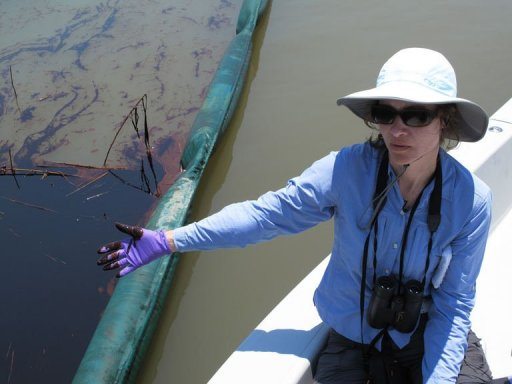At Pass a Loutre, oil seeps deep into Louisiana marshlands as booms fail
By Karin Zeitvogel (AFP) – May 29, 2010 PASS A LOUTRE, Louisiana — Thick black oil hung in the water and stained the bases of the roseau cane at Pass a Loutre, a shrinking patch of Louisiana’s fragile wetlands where crude from the BP spill first hit land and began seeping deep into the fragile marshes. Three rows of boom laid in front of the marshes, which lie 10 miles (16 kilometers) south of the port of Venice and accessible only by boat, appeared to serve little purpose, and if anything were corralling the oil up against the wetlands’ plants, not keeping it away. Coastal scientist Angelina Freeman dipped an amber-colored jar into the oily water to take a sample. … In the emotionless way of a scientist, Freeman described the oil inside the jar — “very black, sort of chocolate-syrupy, really thick” — but also uttered a few “wows” of disbelief. … Freeman was distressed by what she saw, by the heavy smell of oil, by the sight of men in hazmat suits skimming thick oil off the surface of the water. She was upset at seeing no sign of life at Pass a Loutre, a wildlife management area, and that the booms laid to protect the marshes had failed miserably. “It’s upsetting that the oil is inside the boom. It seems to be trapped inside the wetlands, where tidal flushing could help take it off the marshes,” said Freeman, who works for the Environmental Defense Fund. To get to Pass a Loutre, Mayfield’s boat cut through the waters of the Mississippi delta and through small passes bordered by dense patches of cane. “The vegetation was vibrant and it was alive with wildlife – birds were singing, fish were jumping. We saw mullets jumping, pelicans and terns and egrets flying overhead,” Freeman said of the ride. “But here, it’s nothing. It’s almost dead here.” A lone bird perched near a forlorn lighthouse about 100 meters (yards) from where row upon row of boom had been laid to try to protect the marshlands uttered a squawk. “These marshes are extremely important in Louisiana,” Freeman said. “They are the nursing ground for fish and the nesting ground for birds. The marshes protect internal lands from storm damage. They reduce some of the waves from things like hurricanes and act as a filtration system for water by slowing the current and allowing sediment to fall off,” she said. Louisiana’s wetlands make up some 40 percent of all the marshlands in the United States. Oil in the marshes can suffocate plants and animals or poison them with the toxic chemicals found in hydrocarbons. That was likely to happen at Pass a Loutre, where it looked impossible to get the oil out of the cane. “If the roseau cane do end up dying, they have a really intricate root mass and if that goes they won’t hold in the sediment any more. That can really enhance erosion. And we are already having a serious problem with erosion,” said Freeman. …
